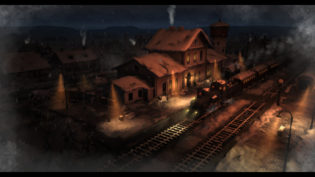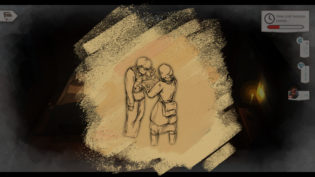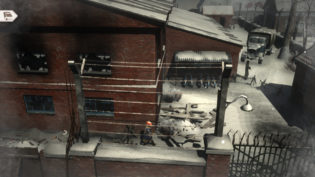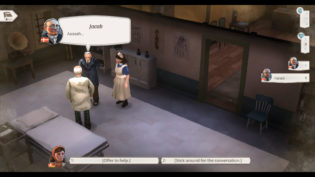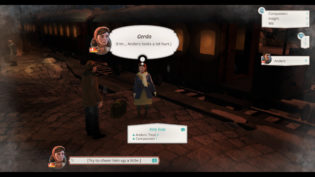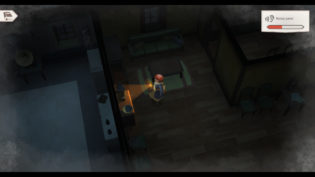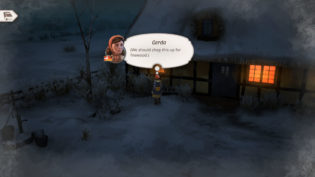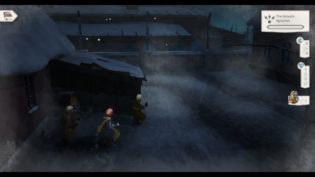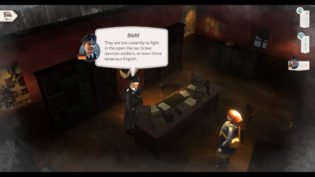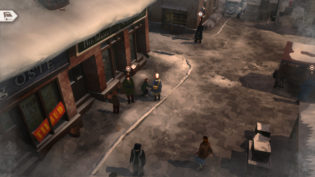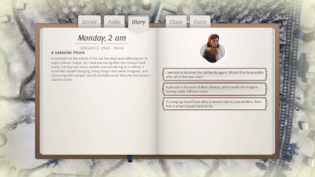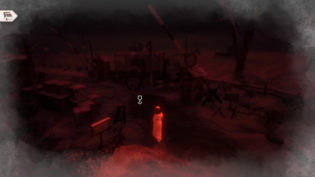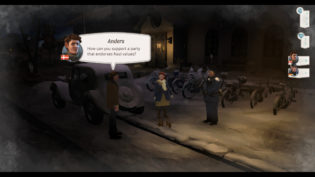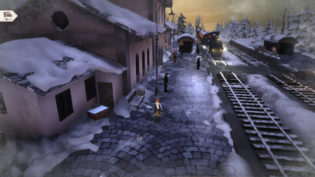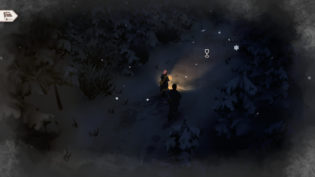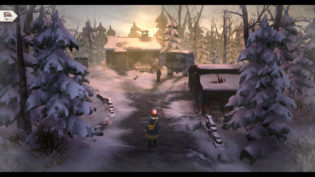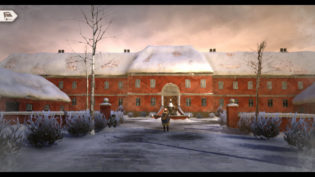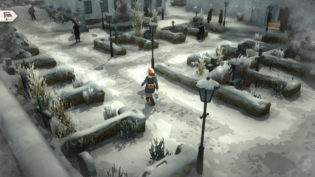It’s a bit of a shame that story-driven adventure titles, and I mean the ones that are almost purely story driven like Telltale titles or Life is Strange, became almost a separate thing, very disconnected from the “classic” adventure games, even the ones that were also heavily story-driven. But at least we’re seeing more of them trying to experiment with the boundaries of the genre more. Gerda: A Flame in Winter is one such title – it’s not about puzzles and free exploration of locations or even really inventory usage in a classic sense, instead it’s all about choices and consequences and the storytelling. But it has a few very cool tricks to achieve its goals, even if it ends up being somewhat rough around the edges.
The game is set during the events of World War 2, specifically the final months of it (apart from the prologue-tutorial) and it presents an interesting perspective on that time being set in a small Danish village of Tinglev that has both German and Danish population and how people, who weren’t directly affected by the war, still felt the effects it had on the economy, the community and the relationships between people. I was afraid, at times, that it would try to ponder to blindly humanist ideals about “divided people who just need to understand one another” (a sentiment that is especially toxic now with the genocidal Russian invasion of Ukraine happening). But luckily, the title doesn’t try to infantilize the players and just leaves tough questions lingering, letting the players answer them for themselves most of the time. And I have to say – the storytelling here is solid and really well done.
As for the gameplay, despite looking and working like a point and click adventure, this title really works far closer to the already mentioned Telltale-style games. Once a scene or an episode (or whatever you’d want to call this) starts, you’re locked in the location, that is usually rather small, and there are some optional actions that you can do, and some obligatory ones that will move the story forward one way or the other, often locking you in a series of events where you must make choices. And then it’s time for another such scene to happen and your previous actions will affect what happens in those next scenes.
However, there’s a twist to this structure. While the overarching story is linear, the way you go through it depends on your choice. The main game’s events happen over the course of several days and they all follow a similar structure. You’re presented with the map of the town and several locations you can visit. Every visit moves the time of the day forward. And while early in the day you usually have all of the options available to you with no issues, as you get to evening, whatever events you have not visited yet become mutually exclusive – you can only select one of the remaining ones, the rest are no longer possible. And then the day ends with some big event, that is usually preceded with a random encounter event, and the situation and options available to you in that last event are, of course, dependent on what you did throughout this day and the previous days.
What’s more, there are many stats and variables – essentially resources – that are constantly used for choice making. Your actions may increase or decrease the trust people have for you, what reputation you have with certain groups of people. Which affects what you can or cannot select in dialogues or the chance of some rolls being successful or not. And yes – rolls. Sometimes the choice you have to or can make is a random chance roll and whenever it succeeds or fails, the story moves forward, but your resources are affected. Items you can find are also used in this system so you can, essentially, bribe people or trade something, or reveal information to someone only if you have it. And after each scene you also have a little summary that let’s you pick an option, each of which give you one point in yet another system of stats that can be used in dialogues. It’s a really cool system which works to create tough decision making a lot of the time.
At times these random elements and forced story events do get in the way. Whenever you get a chance roll that says that the check is Easy and it has several additional checks that you all successfully pass you just expect it to work. But it’s a random chance, so it can fail. And in real life you expect a random roll to miss, but in a story-driven title, where you put far more emphasis on your choice, rather than some random element, when that happens it feels unfair and frustrating. And of course, while the resource managing is a really cool idea, the developers couldn’t cover all bases, so only preset elements are accepted in specific dialogues, even when it makes sense that an item, that you might be carrying from the start of the game, would fit too. It’s extremely rare that this happens, the developers really tried to polish this experience, but it can happen.
The biggest issues, though, are on the technical side. I’ve had the game softlock once, as it got stuck in a dialogue state with no way to do anything. The way animations play out and how pathfinding works can look and feel extremely rough. Not helped by how incredibly limited the field of view always is. The game saves only when you return to the map screen, so if you need to exit in the middle of a 20-minute segment (especially if it’s the last segment of the day and you had a random encounter before it) – you’ll have to replay all of it from before you entered the location.
Overall, though, this is a wonderful title. It looks nice, the music is fitting, the story and characters are well-done and choices feel meaningful and genuinely tough. The resource management for problem solving is a really cool idea, even if it doesn’t always feel right. It’s definitely worth checking out if you’re interested in a story-driven adventure title. And I do hope that more adventure games experiment with using such resource-based systems to enhance the choices and problem solving.


